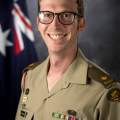I don’t think I’m overstating it when I say that the Australian Army is currently undergoing a Professional Military Education (PME) revolution. Starting with the Ryan Review and then with initiatives such as The Cove, DEF Aus and The Postern Association, there is a ground swell across the ranks of our organisation to ensure that we hold not just the physical and technological edge over our adversaries but also the intellectual edge. And so it should be, after all I think it’s fair to argue that the Profession of Arms is one of the most complex pursuits one can engage in; rivalled perhaps only by Medicine for its emergent nature and the necessity to be comfortable with (but always striving to overcome) uncertainty.
I exist in the world where these two exceptionally complex professions intersect - Combat Health. We are a fascinating bunch. The antithesis of war on one hand in that we are constantly endeavouring to undo the human devastation that war causes, whilst still existing as a key enabler of the moral will and physical capacity to fight for our combat arms brethren. We are also a demonstration of all that is good about having a diverse organisation from which to draw novel solutions to complex problems: we have an officer corps made up predominately of Specialist Service Officers who have learnt their critical reasoning skills from outside of the Army mould; we have one of the highest representations of females of any parts of Army; and a large percentage of our soldiers are tertiary level qualified in clinical fields.
We have rightfully been espoused as an exemplar of professionalism and the continuing professional development that is necessary to master ones chosen path. However, given the complexity of many of the technical aspects of Combat Health, and perhaps due in part to the non-traditional pathways that a large percentage of our organisation take into Army, I would argue that at times our professional development becomes siloed to mastering our individual technical professions and the tactical delivery of Combat Health at the expense of a broader military education. This is to our and Army’s detriment. Without a broader awareness of the Profession of Arms, particularly at the operational and strategic levels, we lack the context in which to deliver our technical expertise to greatest effect. Perhaps more damaging however is the effect this lack of intellectual breadth has on our ability to act as key advisers to command and persuasive leaders in our own right.
So we have a problem. No one in their right mind would argue that reducing the focus on technical mastery is a good move. Given the heavy burden on our individuals to consistently sharpen the scalpel how can we ensure that we’re also sharpening the sword? My recommendation would be active encouragement in embracing social media (SoMe) for professional aims. 35% of average Aussies access SoMe sites more than 5 times a day, and 60% of us are on social media at least once a day. For 60% of us, accessing SoMe is the first thing we do in the morning and for 40% it’s the last thing we do at night. It is now part of our world and it’s not going anywhere in a hurry. Not that long ago Army was hesitant to actively promote professional discourse outside of the safety of our training institutions and messes.
Now however, much of our doctrine is open source and there is an incredibly healthy and accessible discussion going on across Facebook, Twitter, Blogs and Podcasts. You name your SoMe platform of choice and you can find resources to develop your intellectual edge, and for Combat Health professionals, gain the context necessary to excel within the uber-complex environment of crossing medicine with war.
I have compiled a far from exhaustive list of people, platforms and resources that I have found useful as a Combat Health professional to try and sharpen my sword: as one of our flock that has entered the organisation through non-traditional means. My challenge to my peers is to follow, subscribe and tweet a few of these resources, and engage with them on your feed just once a week (perhaps before you go to bed). In this way we will maintain our technical excellence and be able to communicate its complexity and nuance more effectively within the context of the environment we operate within.









